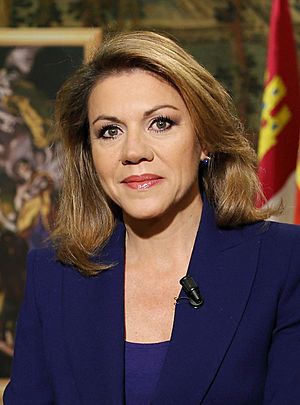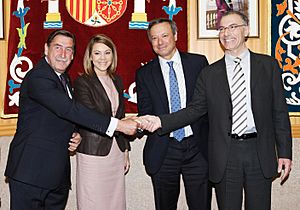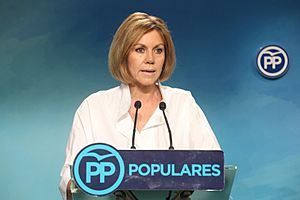María Dolores de Cospedal facts for kids
Quick facts for kids
The Most Excellent
María Dolores de Cospedal
|
|
|---|---|
 |
|
| Minister of Defence | |
| In office 4 November 2016 – 1 June 2018 |
|
| Monarch | Felipe VI |
| Prime Minister | Mariano Rajoy |
| Preceded by | Pedro Morenés |
| Succeeded by | Margarita Robles |
| Secretary-General of the People's Party | |
| In office 21 June 2008 – 21 July 2018 |
|
| Preceded by | Ángel Acebes |
| Succeeded by | Teodoro García Egea |
| 3rd President of Castile-La Mancha | |
| In office 22 June 2011 – 1 July 2015 |
|
| Monarch | Juan Carlos I Felipe VI |
| Preceded by | José María Barreda |
| Succeeded by | Emiliano García-Page |
| Member of the Congress of Deputies | |
| In office 12 January 2016 – 7 November 2018 |
|
| Member of the Senate | |
| In office 12 September 2006 – 22 June 2011 |
|
| Personal details | |
| Born |
María Dolores Cospedal García
13 December 1965 Madrid, Spain |
| Political party | PP (since 1999) |
| Other political affiliations |
PRD (before 1986) |
| Spouse | Ignacio López del Hierro (m. 2009) |
| Children | Ricardo |
| Alma mater | CEU San Pablo University |
| Occupation | Politician, state lawyer |
| Signature |  |
María Dolores Cospedal García (born on 13 December 1965) is a Spanish politician. She was a member of the People's Party (PP). She served as the President of Castile-La Mancha from 2011 to 2015. Later, she became the Minister of Defence for Spain from 2016 to 2018. She also held the role of Secretary-General for the People's Party from 2008 to 2018.
Contents
About María Dolores Cospedal
Her Early Life
María Dolores Cospedal was born in Madrid, Spain, on 13 December 1965. She grew up mostly in Albacete, where she went to school. After finishing high school, she moved back to Madrid for college. She studied Law at CEU San Pablo University. In 1991, she passed a special exam to become a state lawyer. She worked in this important government job until 1996.
In 1999, she joined the People's Party (PP). After the 2000 general election, she was given a job in the government. She worked in public administration and later in the Ministry of the Interior. In 2004, she became the Minister for Transports and Infrastructures in the Madrid regional government.
Leading Castile-La Mancha

In 2011, María Dolores Cospedal was chosen to run for president of the region of Castile-La Mancha. Her party, the People's Party, won the election. This made her the first president from the People's Party in that region in 28 years.
She ran for president again in 2015. Her party received the most votes, but they did not win enough seats to form a government on their own. Because of this, another politician, Emiliano García-Page, became the new President of Castile-La Mancha.
Back in National Politics
After her time as regional president, Cospedal became a member of the Congress of Deputies in 2015. This is like being a member of parliament. She represented the area of Toledo.
In November 2016, she was appointed Minister of Defence by Prime Minister Mariano Rajoy. She held this important role until June 2018. At that time, the government changed after a special vote.
Running for Party Leader
In July 2018, the leader of the People's Party, Mariano Rajoy, decided to step down. María Dolores Cospedal decided to run to become the new leader of the party.
She was one of several candidates. In the first round of voting, she came in third place. This meant she did not move on to the final round of voting. She then supported another candidate, Pablo Casado, saying he would be a "magnificent option" for party leader.
Later Roles
After leaving her role as Minister of Defence, she continued to serve in the Congress of Deputies for a short time. She was the Chairwoman of the Committee on Foreign Affairs. In November 2018, she resigned from her seat in Congress.
In January 2019, María Dolores Cospedal returned to her original career as a state lawyer. She began working for the Supreme Court. In March 2020, it was reported that she and her husband tested positive for COVID-19. They were not seriously ill.
Other Activities
- She is a member of the Board of Trustees for the Elcano Royal Institute for International and Strategic Studies.
Images for kids
See also
 In Spanish: María Dolores de Cospedal para niños
In Spanish: María Dolores de Cospedal para niños



